| Listing 1 - 10 of 16 | << page >> |
Sort by
|
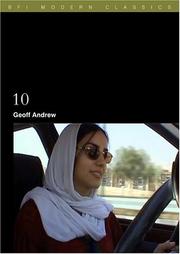
ISBN: 184457069X Year: 2005 Publisher: London : BFI Publishing,
Abstract | Keywords | Export | Availability | Bookmark
 Loading...
Loading...Choose an application
- Reference Manager
- EndNote
- RefWorks (Direct export to RefWorks)
film --- filmgeschiedenis --- eenentwintigste eeuw --- twintigste eeuw --- Iran --- Kiarostami Abbas --- 791.471 KIAROSTAMI
Book
ISBN: 058203292X 9780582032927 Year: 1989 Publisher: Harlow Longman
Abstract | Keywords | Export | Availability | Bookmark
 Loading...
Loading...Choose an application
- Reference Manager
- EndNote
- RefWorks (Direct export to RefWorks)
Motion pictures --- #SBIB:309H1300 --- Motion picture industry --- Biography --- Biography. --- Filmwezen: algemene werken --- Employees --- Cinema films - Biographies - Collections
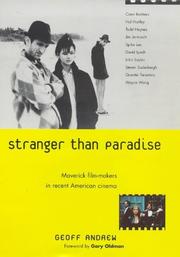
ISBN: 1853752746 Year: 1998 Publisher: New York [N.Y.]: Limelight Editions
Abstract | Keywords | Export | Availability | Bookmark
 Loading...
Loading...Choose an application
- Reference Manager
- EndNote
- RefWorks (Direct export to RefWorks)
Independent filmmakers --- -Motion picture producers and directors --- -Low budget films --- #SBIB:013.AANKOOP --- #SBIB:309H1323 --- Low budget motion pictures --- Low budget movies --- Low budget pictures --- Motion pictures --- Directors, Motion picture --- Film directors --- Film producers --- Filmmakers --- Motion picture directors --- Moviemakers --- Moving-picture producers and directors --- Producers, Motion picture --- Independent moviemakers --- Motion picture producers and directors --- History and criticism. --- Films met een amusementsfunctie en/of esthetische functie: auteurs --- Persons --- History and criticism
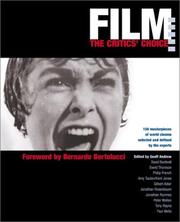
ISBN: 9780823017447 Year: 2001 Publisher: New York : Billboard Books,
Abstract | Keywords | Export | Availability | Bookmark
 Loading...
Loading...Choose an application
- Reference Manager
- EndNote
- RefWorks (Direct export to RefWorks)
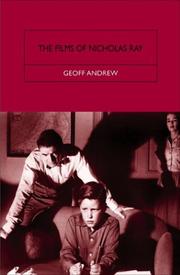
ISBN: 1844570010 Year: 2004 Publisher: London : British film institute,
Abstract | Keywords | Export | Availability | Bookmark
 Loading...
Loading...Choose an application
- Reference Manager
- EndNote
- RefWorks (Direct export to RefWorks)
Book
ISBN: 9780851705699 Year: 2008 Publisher: London BFI
Abstract | Keywords | Export | Availability | Bookmark
 Loading...
Loading...Choose an application
- Reference Manager
- EndNote
- RefWorks (Direct export to RefWorks)
Book
ISBN: 1852381655 Year: 1991 Publisher: London : C. Letts,
Abstract | Keywords | Export | Availability | Bookmark
 Loading...
Loading...Choose an application
- Reference Manager
- EndNote
- RefWorks (Direct export to RefWorks)
Motion picture producers and directors --- Producteurs et réalisateurs de cinéma --- Biography --- Biographies --- Ray, Nicholas,
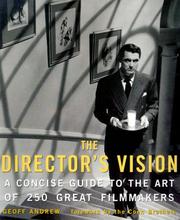
ISBN: 1556523661 Year: 1999 Publisher: Chicago, Ill. : A Cappella,
Abstract | Keywords | Export | Availability | Bookmark
 Loading...
Loading...Choose an application
- Reference Manager
- EndNote
- RefWorks (Direct export to RefWorks)
Motion pictures --- Motion picture producers and directors --- Cinematography. --- Cinéma --- Production and direction. --- Production et réalisation
Book
ISBN: 9781839022616 Year: 2021 Publisher: London Bloomsbury on behalf of the British Film Institute
Abstract | Keywords | Export | Availability | Bookmark
 Loading...
Loading...Choose an application
- Reference Manager
- EndNote
- RefWorks (Direct export to RefWorks)
The Iranian director Abbas Kiarostami burst onto the international film scene in the early 1990s and was widely regarded as one of the most distinctive and talented modern-day directors. His major features - including Through the Olive Trees (1994), Taste of Cherry (1997) and The Wind Will Carry Us (1999) - are relatively modest in scale, contemplative and humanist in tone. In 2002, with 10, Kiarostami broke new ground, fixing one or two digital cameras on a car's dashboard to film ten conversations between the driver (Mania Akbari) and her various passengers. The results are astonishing: though formally rigorous, even austere, and documentary-like in its style, 10 succeeds both as emotionally affecting human drama and as a critical analysis of everyday life in modern Tehran.In his study of the film, Geoff Andrew considers 10 within the context of Kiarostami's career, of Iranian cinema's renaissance, and of international film culture. Drawing on a number of detailed interviews he conducted with both Kiarostami and his lead actress, Andrew sheds light on the unusual methods used in making the film, on its political relevance, and on its remarkably subtle aesthetic. He also argues that 10 was an important turning-point in the career of a film-maker who was not only one of contemporary cinema's most accomplished practitioners but also one of its most radical experimentalists. (Provided by publisher)
Book
ISBN: 2731205261 Year: 1987 Publisher: Paris Éditions Atlas
Abstract | Keywords | Export | Availability | Bookmark
 Loading...
Loading...Choose an application
- Reference Manager
- EndNote
- RefWorks (Direct export to RefWorks)
| Listing 1 - 10 of 16 | << page >> |
Sort by
|

 Search
Search Feedback
Feedback About UniCat
About UniCat  Help
Help News
News